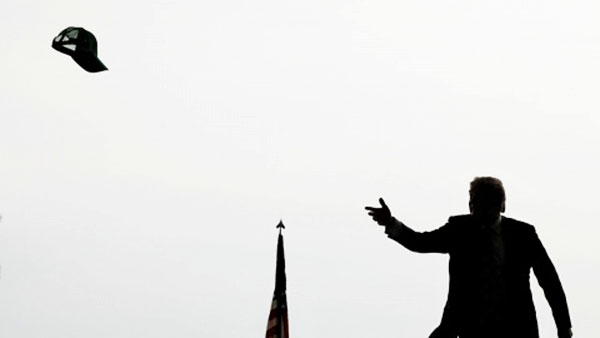Liberal World Order, R.I.P.
by
Richard N. Haass
March
21, 2018
from
CFR Website

Kevin Lamarque/Reuters
The liberal world order
is under threat from its
principal architect:
the United States...
NEW DELHI
After a run of nearly
one thousand years, quipped the French philosopher and writer
Voltaire, the fading Holy Roman Empire was neither holy nor
Roman nor an empire.
Today, some two and a
half centuries later, the problem, to paraphrase Voltaire, is
that the fading liberal world order is neither liberal nor
worldwide nor orderly.
The United States, working closely with the United Kingdom and
others, established the liberal world order in the wake of World
War II. The goal was to ensure that the conditions that had led
to two world wars in 30 years would never again arise.
To that end, the democratic countries set out to create an
international system that was liberal in the sense that it was
to be based on the rule of law and respect for countries'
sovereignty and territorial integrity.
Human rights were to
be protected. All this was to be
applied to the entire planet; at the same time, participation
was open to all and voluntary.
Institutions were
built to promote,
All this and more was
backed by the economic and military might of the U.S., a network
of alliances across Europe and Asia, and nuclear weapons, which
served to deter aggression.
The liberal world
order was thus based not just on ideals embraced by democracies,
but also on hard power.
None of this was lost
on the decidedly illiberal Soviet Union, which had a
fundamentally different notion of what constituted order in
Europe and around the world.
The liberal world order appeared to be more robust than ever
with the end of the Cold War and the collapse of the Soviet
Union. But today, a
quarter-century later, its future is in doubt.
Indeed, its three
components,
... are being
challenged as never before in its 70-year history.
-
Liberalism is in retreat.
-
Democracies are feeling the effects of
growing populism.
-
Parties of the political extremes have gained
ground in Europe.
-
The vote in the
United Kingdom in favor of
leaving the EU attested to
the loss of elite influence.
-
Even the U.S. is experiencing
unprecedented attacks from its own president on the country's
media, courts, and law-enforcement institutions.
-
Authoritarian
systems, including China, Russia, and Turkey, have become even
more top-heavy.
-
Countries such as Hungary and Poland seem
uninterested in the fate of their young democracies.
-
It is increasingly difficult to speak of the world as if it were
whole.
-
We are seeing the emergence of regional orders - or, most
pronounced in the Middle East, disorders - each with its own
characteristics.
-
Attempts to build
global frameworks are failing.
-
Protectionism is on the rise;
the latest round of global trade talks never came to fruition.
-
There are few rules
governing
the use of cyberspace.
At the same time, great power rivalry is returning.
Russia
violated the most basic norm of international relations when
it used armed force to change borders in Europe, and it
violated U.S. sovereignty through its efforts to
influence the 2016 election.
North Korea has
flouted the strong international consensus against the
proliferation of nuclear weapons.
The world has stood
by as humanitarian nightmares play out
in Syria and Yemen, doing
little at the UN or elsewhere in response to the Syrian
government's use of chemical weapons.
Venezuela is a failing
state.
One in every hundred
people in the world today is either a refugee or internally
displaced. There are several reasons why all this is happening,
and why now.
The rise of
populism is in part a response to stagnating incomes and job
loss, owing mostly to new technologies but widely attributed to
imports and immigrants.
Nationalism is a tool
increasingly used by leaders to bolster their authority,
especially amid difficult economic and political conditions. And
global institutions have failed to adapt to new power balances
and technologies.
But the weakening of the liberal world order is due, more than
anything else, to the changed attitude of the U.S.
Under President
Donald Trump, the U.S.
decided against joining the
Trans-Pacific Partnership and
to withdraw from the
Paris climate agreement.
-
It has
threatened to leave the North American Free Trade
Agreement and the Iran nuclear deal.
-
It has
unilaterally introduced steel and aluminum tariffs,
relying on a justification (national security) that
others could use, in the process placing the world at
risk of a trade war.
-
It has raised
questions about its commitment to NATO and other
alliance relationships.
-
It rarely
speaks about democracy or human rights.
"America First" and
the liberal world order seem incompatible.
My point is not to single out the U.S. for criticism.
Today's other major
powers, including,
-
the EU
-
Russia
-
China
-
India
-
Japan,
...could be
criticized for what they are doing, not doing, or both.
But the U.S. is not
just another country. It was the principal architect of the
liberal world order and its principal backer. It was also a
principal beneficiary.
America's decision to abandon the role it has played for more
than seven decades thus marks a turning point. The liberal world
order cannot survive on its own, because others lack either the
interest or the means to sustain it.
The result will be a
world that is less free, less prosperous, and less
peaceful, for (North) Americans and others alike...